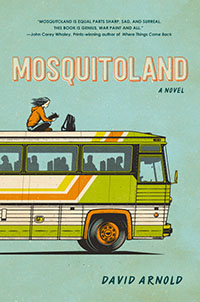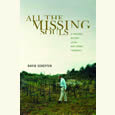A Collection of Oddities
Mosquitoland, a debut YA novel by David Arnold, introduces a snarky but beguiling teen protagonist
“I am Mary Iris Malone, and I am not OK.” This sentence becomes a refrain in David Arnold’s debut novel, Mosquitoland, a road narrative that introduces a beguiling new voice in young-adult fiction.
 Don’t call our heroine Mary; call her Mim. She’s sixteen and clever beyond her years, blind in one eye from staring too long at an eclipse, clad in a beloved pair of fluorescent high-top sneakers from Goodwill, and possessed of a Jon Stewart-grade BS detector. Before the start of Mosquitoland, she’s a party of one, content to volley shots at the world from a self-made fortress of solitude. But then her father—fearing that Mim suffers from the schizophrenia that plagued his late sister, who committed suicide—sends her to therapy.
Don’t call our heroine Mary; call her Mim. She’s sixteen and clever beyond her years, blind in one eye from staring too long at an eclipse, clad in a beloved pair of fluorescent high-top sneakers from Goodwill, and possessed of a Jon Stewart-grade BS detector. Before the start of Mosquitoland, she’s a party of one, content to volley shots at the world from a self-made fortress of solitude. But then her father—fearing that Mim suffers from the schizophrenia that plagued his late sister, who committed suicide—sends her to therapy.
Mim herself is not at all convinced she’s mentally ill. But she knows she’s not a “Generic,” the kind of materialistic, shallow person she can’t stand. “I am a collection of oddities, a circus of neurons and electrons: my heart is the ringmaster, my soul is the trapeze artist, and the world is my audience,” she writes in her journal. “It sounds strange because it is, and it is, because I am strange.”
As her story opens, Mim is marooned in “Mosquitoland,” her name for Jackson, Mississippi, where she moved with her dad several months earlier, post-divorce, from an Ohio suburb. With them is Mim’s newly-minted stepmother, Kathy, toward whom Mim feels no small amount of disdain. After overhearing a critical snippet of conversation between her father, stepmother, and the school principal, Mim steals a large amount of cash from Kathy and makes a quick escape. She’s on a mission, via Greyhound bus, to visit her sick mother, whose letters have stopped coming. With her she carries a journal, her prescription antipsychotic (which she quits taking), and her cell phone (which she doesn’t answer when Kathy calls and calls).
 Mim encounters as much danger on the road to Ohio as any parent of a sixteen-year-old runaway might shudder to imagine: a highway crash, a night in a cheap motel, and a harrowing experience in a diner bathroom with one of her fellow travelers. She’s also threatened by a shady young man who suffers from legitimate psychiatric problems. But Mim does find kindness and grace in the form of several new friends, who shape her journeys—the literal road that leads to her mother and the metaphorical path to greater understanding that so compellingly tracks right along with it.
Mim encounters as much danger on the road to Ohio as any parent of a sixteen-year-old runaway might shudder to imagine: a highway crash, a night in a cheap motel, and a harrowing experience in a diner bathroom with one of her fellow travelers. She’s also threatened by a shady young man who suffers from legitimate psychiatric problems. But Mim does find kindness and grace in the form of several new friends, who shape her journeys—the literal road that leads to her mother and the metaphorical path to greater understanding that so compellingly tracks right along with it.
For all of the close calls and odd birds that stipple Mim’s journey, this book might best be understood as a delightfully engaging character study. Voice is perhaps the most slyly powerful of all narrative qualities: when it’s strong enough, it can drive a book, and it certainly does so here. Mim’s profane, snarktastic voice is Mosquitoland’s white-hot center, its steady glow. This kid could describe eating chips and keep you entertained. She skewers the world with wit and scowly irreverence, but beneath that defense mechanism simmers an irrepressible intelligence.
Youthful disaffection may be a common theme in YA lit, but Mim’s expression of it is fresh, honest, and funny. And it is satisfying to observe the slight blunting of her sharp edges as the story unfolds, the fall of the wall she’s constructed around herself. “All my life, I’ve been searching for my people, and all my life, I’ve come up empty,” she thinks. “At some point, and I don’t know when, I accepted isolation. I curled into a ball and settled for a life of observations and theories, which really isn’t a life at all.”
In the end, her journey and transformation complete, Mim is full of hope and light: “Be a kid of honesty,” she writes in her journal. “Wave it like a banner for all to see. Also, while I’m thinking about it—be a kid who loves surprises. Squeal with delight over puppies and cupcakes and birthday parties. Be curious, but content. Be loyal, but independent. Be kind. To everyone. Treat every day like you’re making waffles.”
Edgy, insightful, and full of heart, Mosquitoland is something new and electric for readers of all ages, with many wise things to say about mental illness, tolerance, difference, and the power of connection with others.

Susannah Felts is a writer, editor, and educator in Nashville, as well as co-founder of The Porch Writers’ Collective, a nonprofit literary center. She is the author of This Will Go Down On Your Permanent Record, a novel, and numerous journal and magazine articles.


